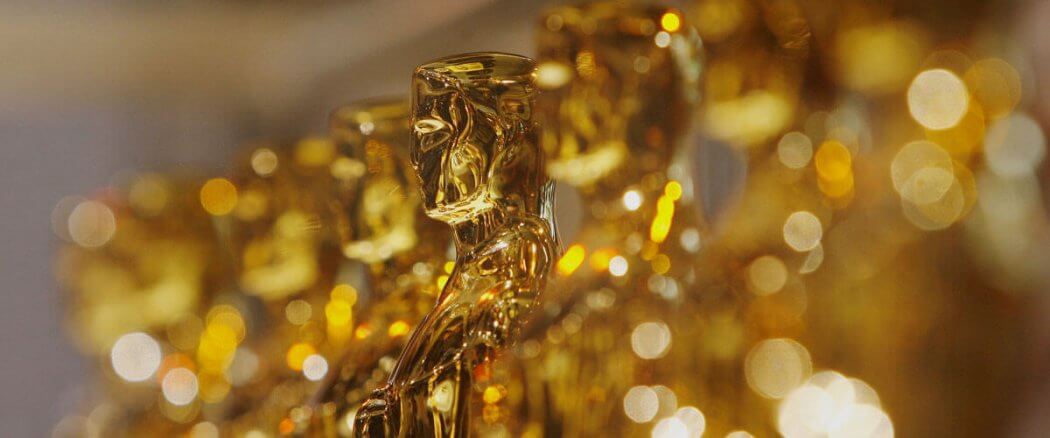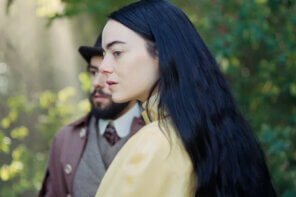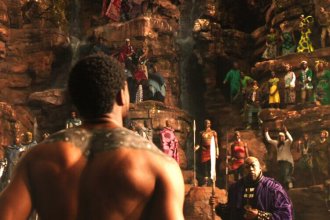The calendar may say we’re in a new year, but 2016 is alive and well for movie lovers. Our calendar runs March to March, because the year in film doesn’t end until Oscar night. The Oscars are our Super Bowl. Everything leads to the one night where movie fans across the world gather together to relive the magic we witnessed for twelve months on the silver screen.
Like the Super Bowl, the nominees aren’t necessarily the most talented films of the year. They’re the movies that were released at the right time to the right audiences in order to grab the spotlight. The Oscars have always gotten more right than they’ve gotten wrong, but the winners still leave us scratching our heads at times.
That’s why at Cinema Faith, we don’t waste time predicting who will win. We savor our time telling you who should win. La La Land may very well win every award of the evening, but it’s not the best picture of the year. What is? That’s what we’re here to discuss. Welcome to this year’s Oscar picks where we choose the most deserving winner in each of the major categories.
We may not be able to help you with your office pool, but that’s not what the Oscars are about anyway. The Academy Awards are a celebration of film itself. Movies are the winner on Oscar night. We celebrate the year that was and look forward with anticipation to what a new one will bring.
Best Adapted Screenplay

Arrival
Fences
Hidden Figures
Lion
Moonlight
Lion is at its best when no one is speaking — the simple shots of a boy trapped on a train, Saroo scouring Google Earth, a family reunited after decades. Words only cheapen what is better left unsaid. Arrival is filled with compelling thoughts about language, but the language of the film itself borders on hokey.
Fences is by far the wordiest script of the lot. There are some riveting monologues, but they all stretch on too long. This is a play that never becomes a film. Hidden Figures, on the other hand, has an outstanding script and a cast that delivers for maximum impact. When Vivian tries to convince Dorothy that she’s not as prejudice as she appears, Dorothy responds with a smile, “I’m sure you believe that.” Vivian is speechless, and so are we.
But nothing can compete with the raw power of Moonlight. Like so many other components of the film, the script is notable for its economy. Every word is chiseled down to its primal essence. When Chiron reveals his heart for the first time, he breaks ours: “I cry so much sometimes, I feel like I’ma turn to drops.” Yet the best scenes are between his adult self and Kevin, both men saying everything without saying anything. Their small talk is anything but, leading to the final moment where words fade away and all that remains is the healing power of presence.
Best Original Screenplay

Hell or High Water
La La Land
The Lobster
Manchester by the Sea
20th Century Women
The writing is the best thing 20th Century Women has going for it, but a few standout lines can’t make up for a choppy, episodic journey. By contrast, Manchester by the Sea is one of the best films of the year, but the script is its weakest element. The performances carry Manchester, not the dialogue they speak. The characters ramble and curse at each other about nothing in particular. It’s their faces that tell the story.
Every song in La La Land is a stand-out lyrically, but what about the normal exchanges between characters? There’s nothing Oscar-worthy there. The razzle-dazzle of the musical moments makes us forget that the live-action dialogue is merely serviceable. Not so with Hell or High Water. Every line packs a punch in that script. After a sobering moment with his fellow bank robbing brother, Toby says, “You talk like we’re not going to get away with this.” Tanner responds, “I ain’t never met anybody who got away with anything. Ever. Have you?” But nothing can beat my favorite exchange of the movie. When the gruff Texas Ranger Marcus interviews a bank employee after a robbery, he asks for a description, “Black? White?” She replies, “Their skin or their souls?” Marcus smiles and says, “Let’s leave their souls out of it for now.”
I can’t believe I’m awarding an Oscar pick to The Lobster. There’s no film I detest more from 2016. It’s perverse and weird and permanently under my skin. But as I look at these five nominees, The Lobster is the most original script of the bunch. This is a world unlike anything we’ve seen before, and the writing deftly balances satire, humor, romance, and dystopia. Take this speech for instance: “Now the fact that you will turn into an animal if you fail to fall in love with someone during your stay here is not something that should upset you or get you down. Just think, as an animal you’ll have a second chance to find a companion. But, even then, you must be careful; you need to choose a companion that is a similar type of animal to you. A wolf and a penguin could never live together, nor could a camel and a hippopotamus. That would be absurd.” Everyone in the theater laughed at this, but it was a nervous laugh laced with apprehension. That’s great writing. I’ll never watch The Lobster again or recommend it to a living soul, but I would be betraying my critical duties not to recognize its sheer creative force. Scripts like this don’t come around often. The Lobster deserves the gold.
Best Visual Effects

Deepwater Horizon
Doctor Strange
The Jungle Book
Kubo and the Two Strings
Rogue One: A Star Wars Story
Ironically, for two films nominated in this category, The Jungle Book and Rogue One: A Star Wars Story are both movies with flawed special effects. The Jungle Book is an impressive achievement considering the entire film was shot in a soundstage, but that doesn’t negate the fact that the animal effects don’t work. I applaud the attempt to create animals that look and feel more realistic than the goofy animation of the original, but something important was lost in the translation. These aren’t just animals. These are characters. We need to feel a connection with them, and their rigid faces — however true to animals in the wild — can’t bridge the gap.
Rogue One makes a similar mistake in bringing a deceased actor back to life in a pivotal role. The effects team painstakingly recreated Grand Moff Tarkin, but the technology still isn’t there yet and the result looks fake. This is something that only works if it’s perfect. Any hint of CGI trickery snaps the illusion and brings the whole enterprise crashing down. And if that wasn’t enough, they decided to double down on the mistake with our beloved Princess Leia. Thankfully she only has one line, but it’s the last line, and seeing her unnatural digital rendering from the 70’s deliver it is soul-crushing.
Doctor Strange fares better, but still feels like an underachievement. I’ll never forget when The Matrix blew my mind. No one had ever seen anything like that before. Maybe we’re too jaded to experience that again, but Doctor Strange had the potential to take us there. This is a film where characters create portals out of thin air, bend city buildings, and stop time in its tracks. So why does the movie feel so boring? Doctor Strange is packed to the brim with the latest and greatest CGI wizardry, but I’ll take the movie from 1999 any day.
If this category was awarded for effort alone, Kubo and the Two Strings would win hands down. I still can’t believe this is stop-motion animation. Every movement of these characters is a real physical creation made with groundbreaking 3D printing technology. The look is stunning. As rich as computer animation has become, this is better. I want to reach through the screen and touch that monkey’s hair. As perfect as it is though, we never forget that we’re watching animation. It’s been said that the best special effects are the ones you don’t notice. If that’s true, then Deepwater Horizon is the standout of this category. I can’t tell you a single shot in Deepwater Horizon that is a digital creation. All I can tell you is that I experienced what it was like to be on the oil well that day, and it was terrifying. This is as seamless as special effects get. And when all is said and done, isn’t that the goal? Deepwater Horizon gets my vote.
Best Cinematography

Arrival
La La Land
Lion
Moonlight
Silence
Cinematography isn’t the first thing that comes to mind when I think about Silence. I’ll never forget the shot of the martyrs hanging on crosses as water rushes over their heads, but I don’t think the camera work stands out as much as other films in this category. The same holds true for Lion, though there is some stunning work in the first half of the movie as Saroo travels through crowded cityscapes. Arrival has more of a visual presence than either of those films. The color palette is a crisp, alien green. I love the image of Louise placing her hand on glass as a monstrous tentacle emerges from smoke to make contact across the divide. It’s the entire movie in one shot.
Moonlight moves beyond mere aesthetics. The camera becomes its own character. Typically movies put us in the bird’s eye perspective. Moonlight wants us to be in the middle of the action. When Chiron and Kevin wrestle in the grass as boys, we glide right into the weeds with them — up close, intimate — we are the intimate observers of a life lived, observing things that no one else sees. This is what makes the final scenes so powerful. A boy became a man before our eyes, and though Chiron puts up a good front, we know the pain that’s still inside of him. We know because we were there.
Let’s get one thing straight: La La Land is a technical masterpiece. Every element that makes up the inner workings of a film is here on glorious display with a new benchmark for quality. It’s not even fair. The camera is alive and well from the very first shot. We glide across a traffic jam and a sea of frustrated faces. Then a woman steps out of her car and begins to sing. Before long the whole freeway joins in, and not once do we cut away from the action. Every scene feels like an unbroken take, whether it actually is or not, and every shot flows with visual magic. But of course, director Damien Chazelle saves the best for last. The movie ends with a montage for the ages — recreating the entire film from a totally different perspective as Sebastian and Mia literally dance through the scenes of their lives. There will be lots of eye-rolling on Oscar night as La La Land claims every award. That’s not bitterness, just good old-fashioned jealousy. Everyone who makes movies wishes they could make one as good as La La Land.
To Be Continued…
Check back next week for part two of our Oscar coverage as we pick Best Supporting Actress, Best Supporting Actor, Best Actor, Best Actress, Best Director, and Best Picture!
UPDATE: Part Two





